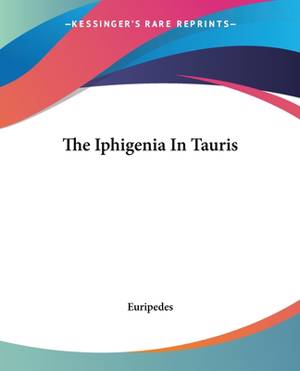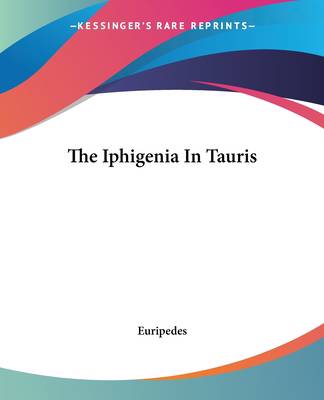
- Afhalen na 1 uur in een winkel met voorraad
- Gratis thuislevering in België vanaf € 30
- Ruim aanbod met 7 miljoen producten
- Afhalen na 1 uur in een winkel met voorraad
- Gratis thuislevering in België vanaf € 30
- Ruim aanbod met 7 miljoen producten
Zoeken
Omschrijving
The Iphigenia in Tauris is a play written by the ancient Greek playwright Euripides. It is a tragedy that tells the story of Iphigenia, the daughter of Agamemnon, who was sacrificed by her father to appease the goddess Artemis during the Trojan War. The play begins with Iphigenia living in exile in Tauris, where she serves as a priestess in the temple of Artemis. She is approached by her brother Orestes and his friend Pylades, who have come to Tauris to steal a statue of Artemis and bring it back to Greece. Iphigenia is torn between her loyalty to her family and her duty to the goddess, but ultimately decides to help her brother. The play explores themes of family, loyalty, and the conflict between duty and personal relationships. It is considered one of Euripides' most complex and nuanced works, and has been widely studied and performed throughout history.ORESTES. O God, where hast thou brought me? What new snare Is this?--I slew my mother; I avenged My father at thy bidding; I have ranged A homeless world, hunted by shapes of pain, And circling trod in mine own steps again. At last I stood once more before thy throne.This scarce antiquarian book is a facsimile reprint of the old original and may contain some imperfections such as library marks and notations. Because we believe this work is culturally important, we have made it available as part of our commitment for protecting, preserving, and promoting the world's literature in affordable, high quality, modern editions, that are true to their original work.
Specificaties
Betrokkenen
- Auteur(s):
- Uitgeverij:
Inhoud
- Aantal bladzijden:
- 100
- Taal:
- Engels
Eigenschappen
- Productcode (EAN):
- 9781419167591
- Verschijningsdatum:
- 17/06/2004
- Uitvoering:
- Paperback
- Formaat:
- Trade paperback (VS)
- Afmetingen:
- 193 mm x 234 mm
- Gewicht:
- 185 g

Alleen bij Standaard Boekhandel
+ 56 punten op je klantenkaart van Standaard Boekhandel
Beoordelingen
We publiceren alleen reviews die voldoen aan de voorwaarden voor reviews. Bekijk onze voorwaarden voor reviews.











